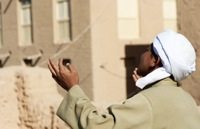Neediness & Thankfulness: Two Keys to Divine Assistance
In the Name of Allah, the Benevolent, the Merciful
Allah’s blessings & peace be upon His beloved Messenger Muhammad, his folk, and companions

Two of the keys to Divine assistance are neediness (faqr) and thankfulness (shukr).
A practical way to this before one’s actions is to take a deep breath, bringing to mind one’s neediness to Allah as one breathes in, and one’s thankfulness to Allah as one breathes out. Try this out, especially before things that are important or stressful.
Neediness to Allah (faqr)
Allah Most High tells us: “O people, you are the ones in absolute need of Allah, and Allah is the one free of all need, worthy of all praise.” [Qur’an, 35.15]
![]()
This neediness is intrinsic to the human being. It is the neediness of the one whose very existent is dependent on Allah’s creating and then sustaining them at every moment, for true understanding of God is to realize that He is the Independent (al-Samad) whom all turn to in complete dependence and the Sustaining (al-Qayyum) who needs none to sustain Him and who sustains everything at every moment. Ibn Ata’illah said, “Become realized in your neediness, and He will assist you through His richness.” [al-Hikam]

Thankfulness to Allah (shukr)
True thankfulness is [1] to appreciate the extent of Allah’s blessings upon us–after all, even our very life and existence, from moment to moment, is a gift from Allah; [2] to rejoice in this blessing, insofar as it is gift from the Giver; and [3] to express one’s appreciation in the ways pleasing to the Giver. Thus, true thankfulness is through excellence in submission. It can also be said that true thankfulness to Allah is to follow the footsteps of the Beloved Messenger of Allah (peace & blessings be upon him & his folk), who said, “Should I not be a thankful servant?”
See:
SeekersGuidance IslamCasts related to Thankfulness
And Allah alone gives success.
Faraz Rabbani
